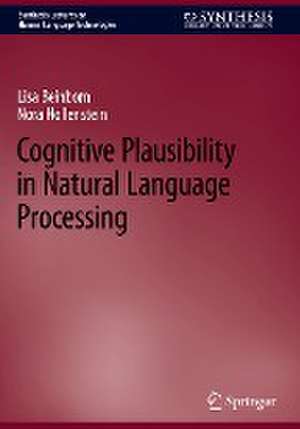Cognitive Plausibility in Natural Language Processing: Synthesis Lectures on Human Language Technologies
Autor Lisa Beinborn, Nora Hollensteinen Limba Engleză Hardback – 31 oct 2023
Din seria Synthesis Lectures on Human Language Technologies
- 20%
 Preț: 223.34 lei
Preț: 223.34 lei - 20%
 Preț: 282.54 lei
Preț: 282.54 lei - 20%
 Preț: 277.60 lei
Preț: 277.60 lei - 20%
 Preț: 227.81 lei
Preț: 227.81 lei - 20%
 Preț: 227.29 lei
Preț: 227.29 lei - 20%
 Preț: 227.12 lei
Preț: 227.12 lei - 20%
 Preț: 274.48 lei
Preț: 274.48 lei - 20%
 Preț: 479.30 lei
Preț: 479.30 lei - 20%
 Preț: 224.65 lei
Preț: 224.65 lei - 20%
 Preț: 415.47 lei
Preț: 415.47 lei - 20%
 Preț: 357.06 lei
Preț: 357.06 lei - 20%
 Preț: 388.17 lei
Preț: 388.17 lei - 20%
 Preț: 226.64 lei
Preț: 226.64 lei - 20%
 Preț: 478.36 lei
Preț: 478.36 lei - 20%
 Preț: 224.50 lei
Preț: 224.50 lei - 20%
 Preț: 334.38 lei
Preț: 334.38 lei - 20%
 Preț: 225.99 lei
Preț: 225.99 lei - 20%
 Preț: 225.67 lei
Preț: 225.67 lei - 20%
 Preț: 166.43 lei
Preț: 166.43 lei - 20%
 Preț: 424.05 lei
Preț: 424.05 lei - 20%
 Preț: 358.95 lei
Preț: 358.95 lei - 20%
 Preț: 225.67 lei
Preț: 225.67 lei - 20%
 Preț: 227.12 lei
Preț: 227.12 lei - 20%
 Preț: 270.04 lei
Preț: 270.04 lei - 20%
 Preț: 537.06 lei
Preț: 537.06 lei - 20%
 Preț: 225.67 lei
Preț: 225.67 lei - 20%
 Preț: 228.13 lei
Preț: 228.13 lei - 20%
 Preț: 353.61 lei
Preț: 353.61 lei - 20%
 Preț: 227.12 lei
Preț: 227.12 lei - 20%
 Preț: 422.25 lei
Preț: 422.25 lei - 20%
 Preț: 270.69 lei
Preț: 270.69 lei - 20%
 Preț: 354.92 lei
Preț: 354.92 lei - 15%
 Preț: 519.18 lei
Preț: 519.18 lei - 20%
 Preț: 226.97 lei
Preț: 226.97 lei - 20%
 Preț: 384.53 lei
Preț: 384.53 lei - 20%
 Preț: 226.64 lei
Preț: 226.64 lei - 20%
 Preț: 503.01 lei
Preț: 503.01 lei - 20%
 Preț: 358.04 lei
Preț: 358.04 lei - 20%
 Preț: 330.75 lei
Preț: 330.75 lei - 20%
 Preț: 327.95 lei
Preț: 327.95 lei - 20%
 Preț: 299.48 lei
Preț: 299.48 lei - 20%
 Preț: 228.28 lei
Preț: 228.28 lei - 20%
 Preț: 382.39 lei
Preț: 382.39 lei - 20%
 Preț: 418.59 lei
Preț: 418.59 lei - 20%
 Preț: 326.13 lei
Preț: 326.13 lei - 20%
 Preț: 271.86 lei
Preț: 271.86 lei
Preț: 246.51 lei
Preț vechi: 308.13 lei
-20% Nou
Puncte Express: 370
Preț estimativ în valută:
47.17€ • 48.95$ • 39.43£
47.17€ • 48.95$ • 39.43£
Carte tipărită la comandă
Livrare economică 12-18 martie
Preluare comenzi: 021 569.72.76
Specificații
ISBN-13: 9783031432590
ISBN-10: 3031432592
Pagini: 158
Ilustrații: XI, 158 p. 3 illus., 2 illus. in color.
Dimensiuni: 168 x 240 mm
Greutate: 0.43 kg
Ediția:1st ed. 2024
Editura: Springer International Publishing
Colecția Springer
Seria Synthesis Lectures on Human Language Technologies
Locul publicării:Cham, Switzerland
ISBN-10: 3031432592
Pagini: 158
Ilustrații: XI, 158 p. 3 illus., 2 illus. in color.
Dimensiuni: 168 x 240 mm
Greutate: 0.43 kg
Ediția:1st ed. 2024
Editura: Springer International Publishing
Colecția Springer
Seria Synthesis Lectures on Human Language Technologies
Locul publicării:Cham, Switzerland
Cuprins
Acknowledgments.- Chapter 1 Introduction.- Chapter 2 Foundations of Language Modeling.- Chapter 3 Cognitive Signals of Language Processing.- Chapter 4 Behavioral Patterns.- Chapter 5 Representational Structure.- Chapter 6 Procedural Strategies.- Chapter 7 Towards Cognitively More Plausible Models.- Bibliography.
Notă biografică
Lisa Beinborn is an Assistant Professor for Natural Language Processing at the Computational Linguistics and Text Mining Lab at Vrije Universiteit Amsterdam. She studied Computational Linguistics in Saarbrücken, Barcelona, and Bolzano, and obtained her PhD in Computer Science at TU Darmstadt. Her research focuses on cognitively plausible language processing and cross-lingual models. She works on the interpretability of representational transfer and is interested in educational applications of NLP.
Nora Hollenstein is currently working at the Center for Language Technology of the University of Copenhagen and at the Department of Computational Linguistics of the University of Zurich. She obtained her PhD from ETH Zurich working on cognitively inspired NLP. The focus of her research lies in improving and evaluating natural language processing applications with cognitive signals such as eye-tracking and brain activity recordings. She is especially interested in multilingual and multimodal NLP
Textul de pe ultima copertă
This book explores the cognitive plausibility of computational language models and why it’s an important factor in their development and evaluation. The authors present the idea that more can be learned about cognitive plausibility of computational language models by linking signals of cognitive processing load in humans to interpretability methods that allow for exploration of the hidden mechanisms of neural models. The book identifies limitations when applying the existing methodology for representational analyses to contextualized settings and critiques the current emphasis on form over more grounded approaches to modeling language. The authors discuss how novel techniques for transfer and curriculum learning could lead to cognitively more plausible generalization capabilities in models. The book also highlights the importance of instance-level evaluation and includes thorough discussion of the ethical considerations that may arise throughout the various stages of cognitive plausibility research.
Caracteristici
Provides a resource for students and researchers in natural language processing, machine learning, and cognitive science Argues that model development targeted purely toward performance-driven evaluation has reached a ceiling Approaches the topic by focusing on behavioral patterns, representational structure, and procedural strategies
